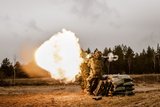Russia says West's attitude stoking tensions in Balkans
The West is stoking tensions in the Balkans despite Russia's pacific stance, Russian Foreign Minister Sergei Lavrov was quoted as saying on 19 February ahead of a visit to Serbia.
Lavrov criticised the West for making Balkan states choose ‘either you are with the West or with Russia,’ in an interview with Serbia's Beta news agency.
He said the European Union (EU) tried to get every aspiring member ‘to harmonise its foreign and defence policies’ with that of the bloc, adding that this was ‘increasing tensions in Europe.’
Serbia is seeking EU membership. Moscow supports Belgrade in not recognising the independence of the former Serbian province of Kosovo, proclaimed a decade ago.
Lavrov said: ‘It is senseless to talk now about Kosovo's place in the United Nations.’
He said that Resolution 1244, adopted in 1999 by the UN Security Council to end the conflict between Serbian forces and Kosovo Albanian pro-independence guerillas, ‘remains in place and recognises the autonomous province Kosovo as a part of Serbia.’
The normalisation of ties with Kosovo and harmonisation of its diplomacy with that of the EU are among key criteria Serbia has to meet to join the bloc.
Lavrov said: ‘Throughout the history of the Balkans, Russia has always tried to avoid confrontation and helped the people of this region to defend their interests... and their spiritual, religious and cultural roots.’
Lavrov criticised the ‘politics of encircling Russia with the military infrastructure’ of NATO and said one ‘should not strengthen one's own security at the expense of the security of others.’
Lavrov said: ‘NATO enlargement is a mistake.’
Montenegro joined NATO in 2017, while Macedonia is a candidate.
Lavrov added: ‘No action currently undertaken by NATO increases anyone's security.’
The minister, due to arrive for a two-day visit to Serbia on 21 February, also defended the role played by the pro-Russian media in the Balkans.
Lavrov said: ‘To protect the pluralism of opinion that the West constantly advocates, to have a different point of view can only be beneficial to listeners, viewers and social network users.’
More from Defence Notes
-
![Venezuela prepares personnel and equipment for a potential second US attack]()
Venezuela prepares personnel and equipment for a potential second US attack
Defence Minister Gen Vladimir Padrino López has declared that the Venezuelan armed forces “will continue to employ all its available capabilities for military defence”.
-
![How might European countries look to tackle drone incursions?]()
How might European countries look to tackle drone incursions?
Disruption of infrastructure in Europe, whether by cyberattack, physical damage to pipelines or uncrewed aerial vehicles flying over major airports, as has happened more recently, is on the rise. What is the most effective way of countering the aerial aspect of this not-so-open warfare?
-
![Taiwan approved for $11 billion weapon purchase from US]()
Taiwan approved for $11 billion weapon purchase from US
The US State Department’s approval of a multi-billion-dollar sale of weapons to Taiwan includes tactical mission networks equipment, uncrewed aerial systems, artillery rocket systems and self-propelled howitzers as well as anti-tank guided missiles.
-
![Ireland spells out $2.3 billion shopping list in five-year defence spending plan]()
Ireland spells out $2.3 billion shopping list in five-year defence spending plan
Ireland’s multi-annual investment in capital defence spending is set to rise from €300m in 2026 to €360m in 2029–2030 with major upgrades across land, air, maritime and cyber domains.
-
![Canada to deepen integration of multi-domain capabilities to strengthen its defences]()
Canada to deepen integration of multi-domain capabilities to strengthen its defences
The Canadian Department of National Defence has created new organisations to manage the procurement and integration of all-domain solutions and allocated US$258.33 million to strengthen production capacities.
























